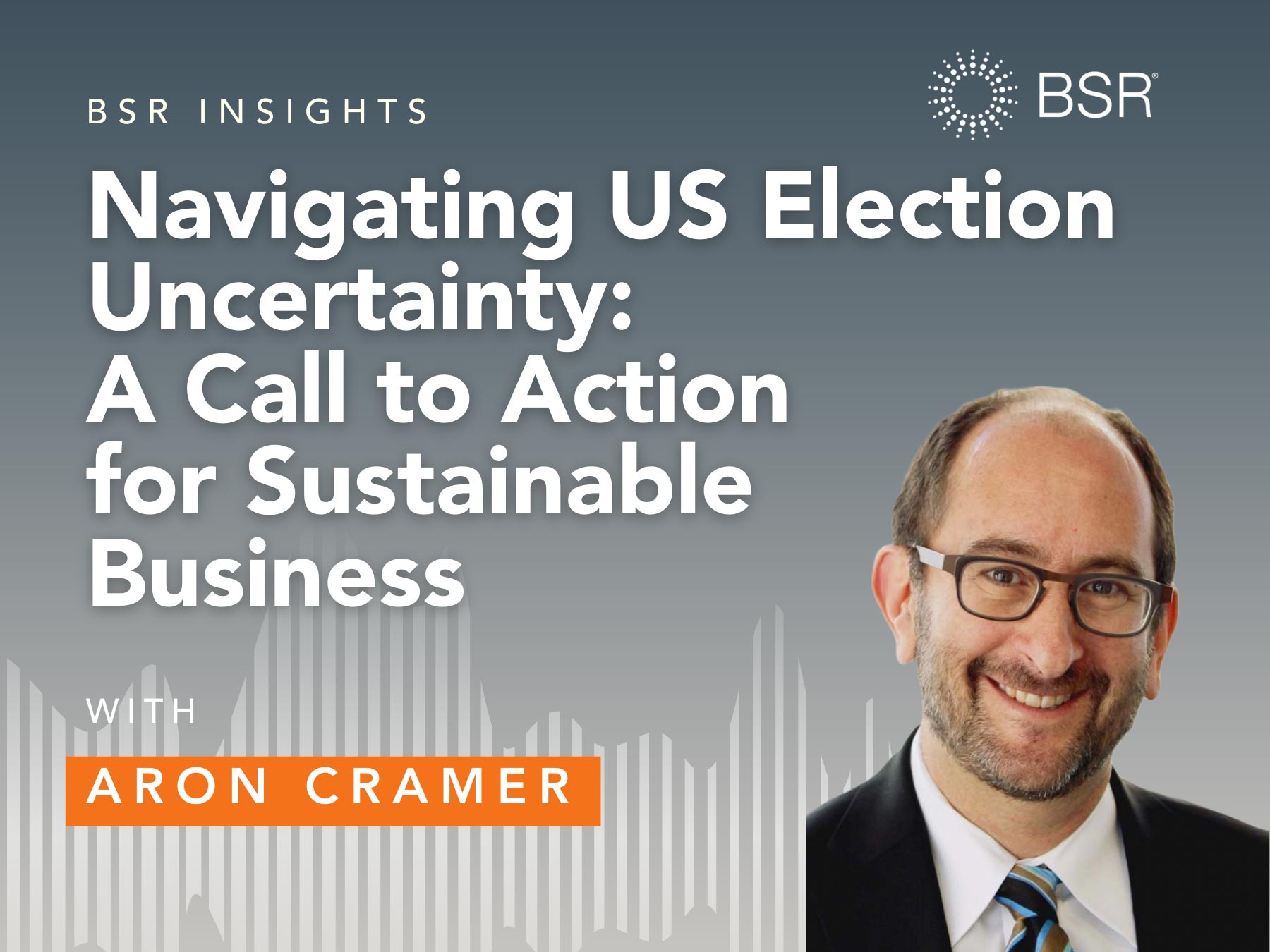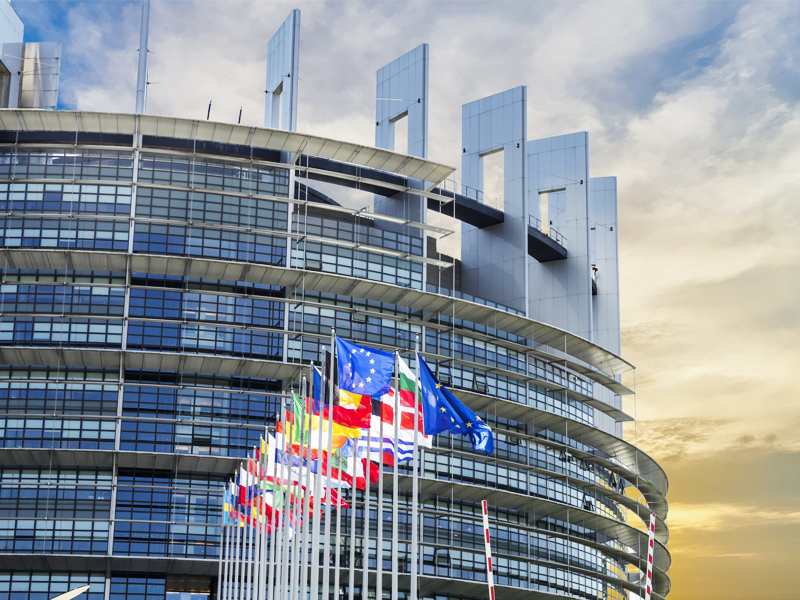
Editor's Note:
It is obvious that we are living through a time of profound and accelerating change. Our world has been rocked by a series of disruptions: COVID-19, war and social conflict, rollback of rights and democracy, and now high inflation and the risk of recession. These developments have jolted society, and business.
To help our 300+ member companies navigate this volatile environment, we're releasing a series of blogs over the coming weeks to build insight into how to shape business approaches that address this unique moment. Following last week's piece on the "backlash" against ESG, today's piece explores changing expectations of business in protecting rule of law, rights, and democracy.
We’ll conclude with a deeper dive look into how BSR’s 2025 strategy can help your company to navigate these turbulent times—and how you can collaborate with our global network to push us further, faster, to achieve a more equitable, just world for all.
Russia’s invasion of Ukraine. China’s suppression of civil liberties in Hong Kong. Ongoing attacks on voting rights, abortion access, and LGBTIQ+ health and safety in the United States.
Around the world, we see these and other examples of democratic decline. From multiple directions, the foundational elements of societies based on rule of law, transparently and evenly applied, are facing significant threats.
To state it bluntly: this presents a clear and present danger for business. Indeed, a recent poll from Morning Consult found that more than 80 percent of business leaders see threats to democracy as threats to business.
First and foremost, it is exceedingly difficult for business to thrive where rule of law is absent, where governments are paralyzed, and where instability is the status quo. Indeed, the decline of rule of law in Hong Kong is causing many companies to shift staff and offices away from that territory. This is not new. Businesses have long recognized that operating where the rule of law is strong is in their self-interest; after all, it protects business, employees, and consumers alike from harmful practices, and helps provide safeguards against governments which otherwise might engage in abusive practices.
Second, business finds itself embroiled in polarized and angry debates that both reflect and cause the deterioration of public institutions. Many companies have been drawn into the crossfire of policymaking in various American states in the wake of the overruling of Roe v. Wade. Initial efforts by many companies to provide travel stipends for workers who need to travel to access abortion services have been challenged by political figures. Similarly, government inaction on climate change creates both economic and social risk, and it also can lead to an unpredictable environment in which some aim to fill the policy vacuum through litigation. This creates an inconsistent and unpredictable approach to policymaking. Dysfunctional governance creates and amplifies business risk and uncertainty.
Third, many employees and consumers expect business to speak out on this, and other, important social issues. Worker, consumer, and investor sentiment supports companies taking decisive action. There also has been increased scrutiny of companies that continue to financially support elected officials in the United States that refused to certify the results of the 2020 presidential election.
Fourth, and finally, there is a values case for action. We regularly engage with senior business people who are angry with the decline of democratic institutions in their home countries as well as in the wider world. Many business leaders do not want to stand aside while fundamental rights and freedoms are under attack. In addition to their own preferences, they also see employees, customers, and sometimes shareholders pushing them to express support for public institutions and processes. They face numerous cross-pressures, however, with many voices challenging the wisdom, and even the right, of companies and business leaders to speak out on topics many see as “political.”
What Can Business Do?
First, business should extend its stated commitment to human rights principles to apply more explicitly to the protection of democratic institutions, wherever they are in peril. Most large companies have now committed to upholding the UN Guiding Principles on Business and Human Rights. Much of the impetus for this movement focused on human rights abuses and poor governance in the global south. It is now time to deploy them closer to home, for example by considering whether law enforcement is equitable when making siting or investment decisions.
Second, business can take action through large-scale collaborations. Initiatives such as the Voluntary Principles on Security and Human Rights and the Extractives Industry Transparency Initiative are designed to combat non-democratic means of violating rights that affect business directly. Such efforts leverage strength in numbers, with companies, NGOs, and governments working together to achieve reforms that have made a real difference. These models, which promote law enforcement and provision of private security consistent with human rights principles, are good examples of how collaboration is a useful tool to address violations of rule of law.
Third, business can advocate for systemic or structural reforms. Though some will characterize these efforts as partisan, the actual approaches offered can be decidedly nonpartisan, such as supporting action on issues, including the protection of voting rights to ensure full and equal access, the potential for mandatory voting requirements, and other electoral reforms.
Fourth, and particularly in the United States, companies can withhold political contributions from elected officials and aspiring candidates who fail to commit to upholding democratic processes and the rule of law, There is a rising tide of criticism of such practices, including in shareholder resolutions. The silver lining of the current situation is the opportunity to push back against the arms race of political funding.
Finally, it is time, once and for all, for companies to address the many concerns about the role of trade associations. Companies such as Volvo, Shell, BP, TotalEnergies, and others have conducted formal reviews, with public disclosure, of their membership in trade associations, aiming to reduce misalignment with their ESG priorities. It is also well past time for trade associations themselves to recognize that new threats require new thinking and new models. Advocating for reduced taxes and regulations cannot be the only priority if they are to have a positive impact not only for business, but also for society. If trade associations cannot rise to the occasion and see the bigger picture by calling for democracy protection, perhaps they have outlived their usefulness.
We can anticipate significant pushback against business taking on this agenda. This is “too political,” and business cannot “pick sides.” In fact, many businesses already do take sides when weighing in on legislation, e.g., with many businesses and associations arguing that the SEC is exceeding its mandate with its draft regulations requiring climate disclosure.
In the final analysis, it is no longer difficult to imagine a near total breakdown of the public institutions the West has taken for granted for the 75 years since WWII ended. Eric Vuillard wrote in The Order of the Day, his satirical account of the run-up to WWII, that “great catastrophes often creep up on us in tiny steps.” Business cannot afford to wake up one day and find that the societal foundations on which it relies have collapsed. Business is taking action to combat a similar challenge with respect to climate Isn’t it also time for business to recognize that it can no longer wait for others to address the looming disaster of the collapse of democratic institutions and processes?
Topics
Let’s talk about how BSR can help you to transform your business and achieve your sustainability goals.









